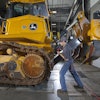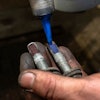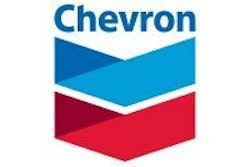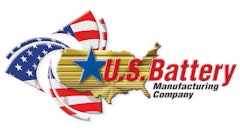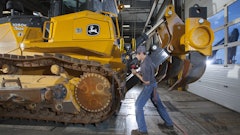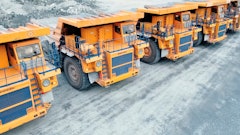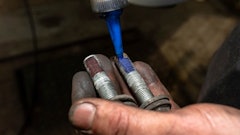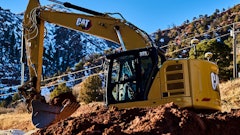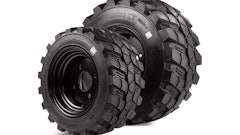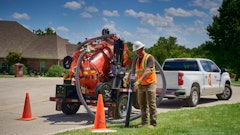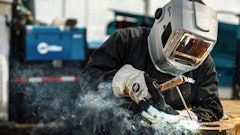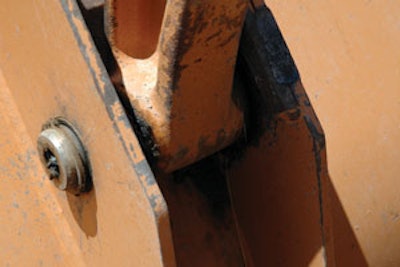
It's possible to consolidate greases used in your fleet, but you must understand the applications and tradeoffs. Speed, temperature, pressure and working environment influence selection. "Over 95% of the construction applications are slow-moving, articulating components that have high pressures and a tendency for contamination," says Mark Betner, Citgo.
Staying power - the ability to not leak out under high breakout forces - is one of the most critical requirements. "The first thing you should look for is a grease that will stay put so you don't have to constantly re-lubricate; or one that will at least last for a reasonable period of time, where you can [maintain] your regular maintenance schedule without causing high wear in the components," says Betner.
Grease must contend not only with the physical forces it encounters, says Betner, but also with water and the potential for dirt contamination. In some cases, the grease must also survive high temperatures.
There are "all-purpose" grease products that will work in these situations, but at a price. Improper selection or application of grease is one of the biggest causes of lubricant-related failures, according to Bob Theisen, manager of technical services, CHS Inc., manufacturer of Cenex brand products. "Lubricant-related failure of almost any type of grease falls into a handful of categories. It is either the wrong type of grease for the application; incompatible greases were mixed; or contamination was introduced, causing excessive wear and premature failure," he explains.
"If you are going to try to use one grease for everything, I can almost guarantee that something is going to get compromised to some degree," adds Betner.
When planning to consolidate greases, identify your most severe applications. "Where is the greatest likelihood of having repairs as a result of using a grease that is not up to the job?" asks Betner. "Do you want to select a grease that will protect the most severe application first and foremost, or do you really consider all-purpose more important?
"Everybody wants to simplify life and reduce inventory," he acknowledges. But with the cost of the equipment, downtime and repairs, it sometimes makes more sense to carry different products for the most severe applications.
Similarly, don't let occasional-use applications play too large a role in your main grease product selection. "If a tool salesman came in and told you to throw all of your different tools away, then offered to sell you the best Crescent wrench in America, what would you do?" Betner asks.
He admits that some greases do a very good job of balancing multiple demands. Your lubricant supplier is a good source for this information. "We can come up with one product that will do a fairly good job at almost everything, but it will not do the best job," Betner adds.
Base oil determines application
Grease consists of three main components: a base oil, a thickener and additives that enhance performance. While greases may all look the same, it is important to realize how complex these formulations really are.
Heavy-duty construction-type greases generally have higher oil viscosities. "Bucket pins, hinge pins, dump beds - anywhere you have a tremendous amount of weight pivoting back and forth can benefit from using grease with higher viscosity base oils in their makeup," says John Geyer, grease business manager for industrial and integrated solutions, Chevron. The heavier the load, the higher the viscosity of base oil you will often want to prevent as much metal-to-metal contact as possible.
Lighter oil viscosity multipurpose greases can often be squeezed out between surfaces. "You can actually wind up with metal to metal contact," says Geyer. But the lighter oil viscosities do allow these multipurpose greases to work in a broad spectrum of climates. "The issue is that they don't always afford you the best protection on the equipment."
Synthetic or semi-synthetic greases add performance advantages in terms of oxidative and thermal stability, according to Theisen. This is important for high-temperature applications, but synthetics also help somewhat in low temperatures.
Geyer points out that synthetics can do well in both extremes. "PAO-based synthetic oils give the grease much better flow properties in extreme cold than mineral-based oils." When used in conjunction with a lithium complex thickener, they also have higher heat capability. "If you have an application that is breaking down the mineral oil-based grease due to excessive heat, you could try a grease containing synthetic base oils as a correction to the problem."
Temperature variations also affect pumpability of the grease. Typically, a NLGI 2 grade is used in most construction equipment applications during the summer months. In cold climates, grease is then switched to a lighter viscosity NLGI 1 grade for the winter months.
Automatic lubrication systems require the use of even lighter grades of grease, typically NLGI 0 or NLGI 00 grades. NLGI 1 grade grease can sometimes be used, depending upon the environment. Automatic systems often will not tolerate the heavier NLGI grades normally used for manual greasing. "The central systems are not as friendly when it comes to using higher viscosity oils when you are trying to pump them greater distances," Geyer points out.
For example, say the automatic centralized system is pumping grease through a 1/4-in. line that runs up a 25-ft. boom and down a 25-ft. pivot boom on the other side to the bucket. "The system is trying to pump a thick product through a very small opening," Geyer explains. "You get a lot of resistance." Climate often plays a serious role here, as well.
Autolube systems compensate for the lighter viscosities by providing a continuous supply of fresh grease, which purges contaminants from the joints. "Keep in mind that a central system continually feeds grease to the application throughout the work day as compared to once or twice a day manually," says Betner.
With synthetic-based grease, you may be able to use a slightly heavier NLGI grade in the autolube system due to the grease's enhanced flow characteristics. However, use of an autolube system will require the stocking of separate greases.
Thickener affects compatibility
Greases are thickened by various types of soap; this thickness helps determine the NLGI grade. "If the grease is a NLGI 2 product, to make a NLGI 1, you reduce the percentage of thickener or soap content by adding more oil," Geyer explains. "In essence, the grease is getting softer."
The thickener type also determines compatibility. "Out of the three components of the grease - oil, thickener and additives - the thickener has the greatest impact on compatibility," says Betner. Poor compatibility can result in excessive softening or hardening of the grease.
"It's always best to err on the side of caution when changing out greases," Geyer emphasizes. "Ask the lubricant supplier if there will be any concerns."
Many different thickeners can be used. "Typically, the most common greases of choice in this area are lithium or lithium complex thickened greases," says Geyer. "The reason is that lithium and lithium complex soaps are generally fairly compatible with one another. You have fewer issues than with some of the other soap types that are out there."
Lithium-based products make up the largest percentage of greases used. Of these, lithium complex greases are the most popular. "The lithium complex with the proper additives would be your premium-type product. It has good high-temperature properties. It has good water washout resistance and it is a very stable product," says Theisen.
Lithium 12 hydroxystearate is a type of generic lithium grease, but it has a lower dropping point. It is therefore not well suited to higher temperature applications.
Poly urea-based greases are another product gaining in popularity. These greases also provide high temperature life and water resistance. "But if you are using lithium-based grease and go to poly urea-based grease, you really have to flush out the bearings in the system to make sure you don't run into compatibility issues," says Theisen.
When water washout is a problematic issue, there are other options, as well. "Aluminum complex greases are very good in the water washout area," says Theisen. "There are also calcium soap greases that are extremely good in water resistance."
Softer greases typically exhibit slightly lower dropping points. "As you add more oil and reduce the thickener or soap content, you will cause issues with your dropping point," says Geyer.
You also need to be aware of how the dropping point applies to your application. For example, a product information sheet might claim the dropping point is 500° F. This may lead you to believe you can run this grease at 500° F. "That is not true," Betner states. "The dropping point, by definition, is the temperature at which grease turns from a paste into a liquid. For actual application range, you have to drop about 150° F off the dropping point as a minimum. If the dropping point is 500° F, sustained temperatures should not run higher than 350° F at the most to avoid constant re-lubrication."
Lithium complex greases tend to have higher dropping points than straight lithium greases, making them better suited for mixed fleet applications. "They give you the ability for greasing front wheel bearings on pickup trucks, where you have disc brake applications and you are required to have higher temperature greases," says Geyer.
Though typically fine for off-road heavy equipment, straight lithium greases are not suited for disc wheel bearings on pickups. "Their dropping point is not there and you could, in some circumstances, end up with oil on the brake linings," Geyer explains.
Additives impact performance
"For the construction trade, molybdenum disulfide (moly) can be an important factor in terms of the type of grease you want to use," says Theisen. "One reason is that the sliding and rubbing contact you encounter in pins and bushings requires both extreme pressure and anti-wear properties, and also good tenacity to keep it from squeezing or washing out. The moly creates more of a solid lubricating film around heavily-loaded pin joints."
Moly also provides an added layer of protection if the grease gets forced out of the joint. "That moly is a dry-film lubricant that creates a barrier in the event that the grease gets displaced," Betner explains.
"Moly is thought to help fill in the asperities in metal," says Geyer. Consider bucket pin and bearing surfaces. "If you put those very smooth, mated surfaces under a microscope, they wouldn't look smooth. You would see peaks and valleys created during the machining process." The moly fills those peaks and valleys.
Some manufacturers require the use of 3% to 5% moly to maintain the warranty. Yet, any additive can create new challenges as it solves others.
Consider moly. "You can actually reduce the flow properties of the product," says Geyer. "Bear in mind that moly is a solid additive. So when you are trying to work with the moly grease in the winter, you often have to bring your oil viscosities down because it just does not want to flow as well as in warmer weather situations. There are many heavy-duty greases out there that will give very good performance that don't necessarily contain moly."
Water washout is another problem that can be addressed with additives. "Water washout in itself is a physical phenomena and it can also attack the grease," says Betner. "Some additives - synthetic polymers - tend to resist water. There are also some corrosion-resistant additives that don't necessarily prevent the removal of grease, but they do prevent rust and corrosion that can be associated with water washout.
"It is important to have physical retention of the grease," he continues. "But then you must also consider that water will eventually penetrate anything, so you want corrosion-resistance additives."
Most greases have water washout, corrosion and salt water ratings. "I encourage anyone to find out how the grease performs in those areas," notes Betner.
"Tackifier additives also aide in the ability to fight washout and spray off," says Geyer. But there is a downside. "The additional tackifier in grease can often give you trouble with pumpability in the wintertime."
Of course, in these applications, extreme pressure (EP) additives also will help handle the loads.


